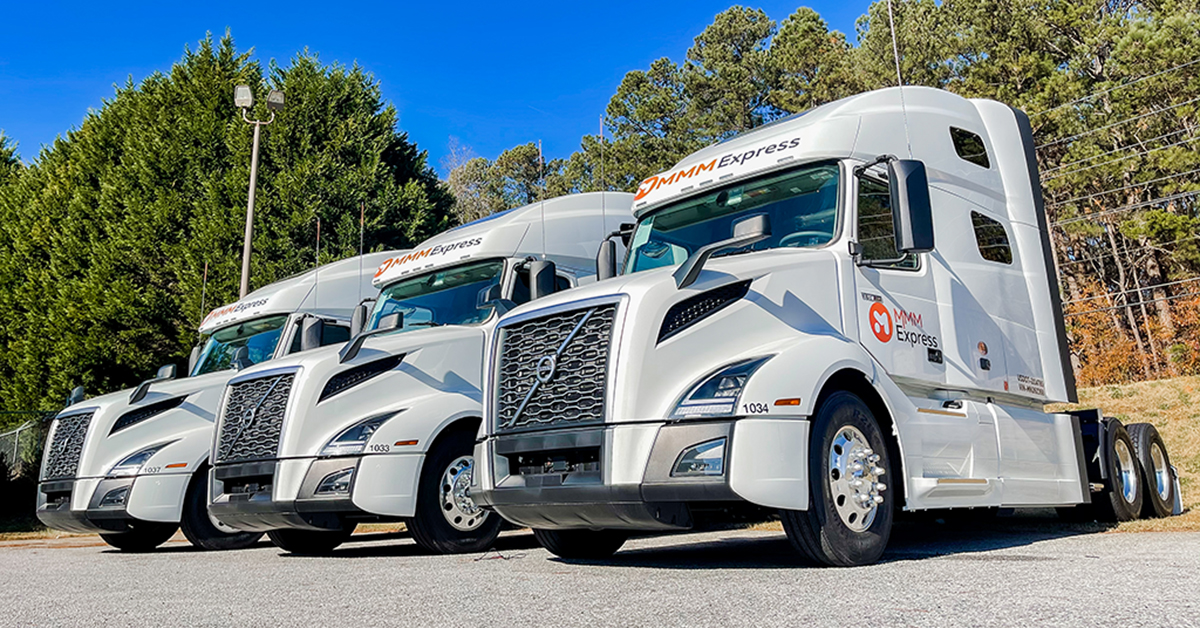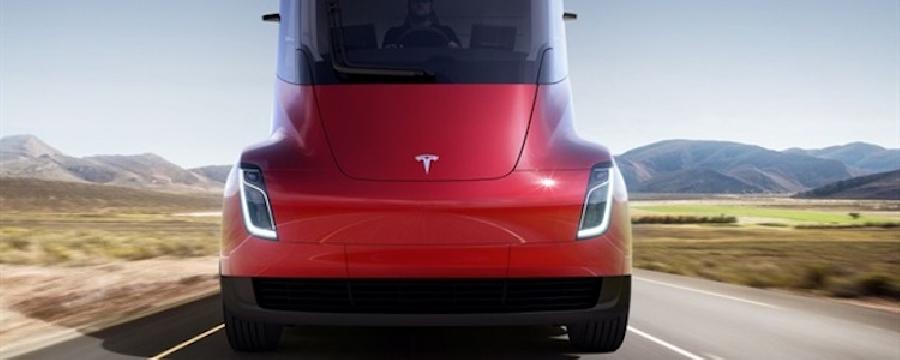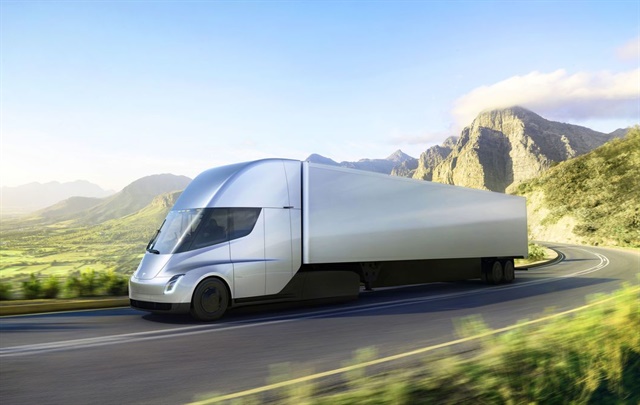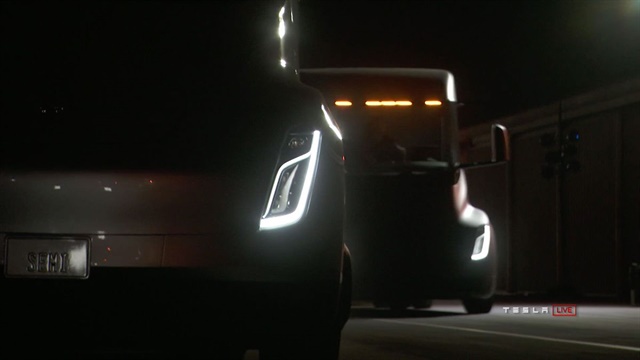

Posted on November 29, 2018 13:50:54

A few days have passed since Elon Musk of Tesla and SpaceX fame strode the boards on a makeshift stage in an airport hangar in Hawthorne, California, revealing to the world his much-touted electric semi-truck.
I wasn't there, bathing in the glow of the prodigal son's new toy, nor the tech-worship that follows wherever he goes. But I have since read many of the post-launch reports, and like more than a few others, I'm pretty skeptical about the future of this vehicle.
Back in May, when a few images of the truck were leaked, purposefully probably, to the worldwide web, I penned a column expressing my skepticism about the Tesla semi-truck. Most of what I was suspicious of then, I'm still suspicious of now.
The big reveal really didn't shed much new light on the project, but it did give birth (almost literally, when the car rolled out of the back of a trailer towed by the electric tractor) to an insanely fast Tesla roadster with a going price of $200,000. I suspect the semi-launch was really click-bait for this thing.
What we now know about the electric Semi is hardly worth knowing in the face of what we still don't know. Musk claims the truck will run up to 500 miles on a single charge at 65 mph at full gross weight. Okay, that's good. What we don't know is how big and heavy the battery pack will have to be to support that kind of range.
A story I did a few months back quoted another story in Wired magazine from June 2017, where a couple of experts, Venkat Viswanathan and Shashank Sripad, suggested the Tesla truck would run a lithium-ion battery system that generates 243 watt-hours per kilogram at the cell-level. To cover 600 miles without stopping to charge, the authors said, the truck would need a 14-ton battery. Based on current prices, those packs would cost between $290,000 and $450,000. The authors also noted that a next-generation “beyond-lithium-ion battery-pack” could provide a 600-mile range at a cost of about $180,000, leaving enough room for a payload of about 16 tons.
Julie Furber, executive director of electrification business development at Cummins, told me much the same thing. "The current battery technology just isn't ready for the linehaul market where trucks can run up to 140,000 miles annually," she said. "We've done some rough calculations that show you'd need a battery that weighs 22,000 pounds to complete a full day's driving at highway speeds."
The fact that Musk never mentions the batteries raises a few red flags.

Image: Tesla
Oh, sure, it'll go from zero to 60 in 20 seconds with a full load. Imagine how many tires drivers will shred doing that? Or how much juice a stunt like that would drain for the 500-mile range? Heck, the truck will also climb a 5% grade at a constant 65 mph. Any respectable diesel will do that too, if you open it up. The problem is fuel consumption. Drain your fuel tank or drain your battery, the energy to get 40 tons up a hill at 65 mph has to come from somewhere.
I doubt that many serious fleet ears perked up at that comment. That certainly wasn't what they were hoping to hear. And that leads me to the inescapable conclusion that Musk wasn't in Hawthorne on a Friday night to sell this truck to fleets. He was way off message if he was.
There was a lot of stuff missing in Musk's message, like any hint that he was developing a dealer network, or that he was starting to work out some of the manufacturing challenges.
The major OEMs today have better than 50 years in this market. They are always adjusting their testing, evaluation and production methods, and still they get things wrong occasionally. How Musk plans to go into production with this truck by 2019 without any reliability growth testing or fleet in-service testing is beyond me. Maybe that's why his SpaceX rockets have been such spectacular successes.

Image: Tesla
I've been to all of the truck OEMs' manufacturing facilities and most of the test and development facilities.
I've seen things as mundane as pitman arms sitting in a testing jig for a few months, bent and torqued until they broke so the manufacturer would know the part would last a decade or more in real-world service. I've seen the cab-shaker machines that rattle the daylights out of a truck cab for weeks on end to see which parts fall off and which survive the ordeal. We heard nothing like that from Musk Nov. 17.
Remember EPA 2007? The OEMs didn't have the time they needed to perfect the aftertreatment and EGR system on that first generation of trucks (thanks billions, EPA), and fleets paid a dear price for that.
And where will we take our Tesla Electric Semis when they break down? To the local Tesla dealer? What do they know about commercial vehicle suspensions or steering systems or brake systems, for that matter? I would have thought if Musk was serious about getting this truck to market, he would have taken the time to explain a little about his manufacturing, distribution, and service plans.
What on earth makes you think Elon Musk can successfully bring a brand new type of truck to market in just 24 months without being eaten alive by warranty claims?
Fleets don't buy trucks because they're cool. ROI is a very big part of the decision-making process, so you'll have to forgive me for feeling a little disappointed when all we get from Musk is a figure of $1.26 per mile. What's baked into that figure? Does it factor in all the shredded, tread-less tires fleets will have to replace over the truck's life?
We can eliminate the cost of a conventional Class 8 powertrain and the associated hardware of maybe $70,000, but we have to include the cost of the batteries, which our aforementioned experts, Viswanathan and Sripad, say could cost between $290,000 and $450,000. Unless Musk is going to pay you for using his mega-generated electricity, I can't see how fleets would amortize the battery packs over four to five years, never mind the entire truck.
Maybe Musk sees a million-mile, 10-year trade cycle? I wonder if he has factored in the lifecycle costs of components like suspensions, HVAC systems, brakes, seats, driver controls, interiors ... Today, a 10-year-old truck looks and runs like a 10-year-old truck. I can't see the Tesla Electric Semi looking and running like brand new after a decade on our highways.

Image: Tesla
Even the concept of his mega-charging stations has me a bit confused. You'd need a county-sized solar array to collect enough energy to fast charge even a few dozen trucks a day at a single charging station. You're not likely to find many of them anywhere near a major metropolitan area where these trucks are likely to operate. So, draw the power from the grid instead, and recalculate the cost based on utility rates – even bargained down based on volumes – and Musk's $1.26 a mile cost figure goes right out his "thermonuclear explosion-proof" window.
The other question that arises is the batteries' ability to charge in the record time Musk claims, 30 minutes to 80% charge. From what I have been reading, there isn't yet a battery on the planet that can withstand such a flow of electrons, such as from an 800-volt, 350kw/hr charger. Porsche unveiled such a system in July, and says it's very much a prototype that isn't expected to be in service until 2019. Presently, most electric vehicle batteries can withstand a mere trickle or 50-150 kw/hr.
According to a report published by IVL Swedish Environmental Research Institute, the production of lithium-ion batteries for light electric vehicles releases on average 150-200 kilos of carbon dioxide equivalents per kilowatt-hour battery. For example, Tesla's Model S uses a 100kw/hr battery, meaning it has already accounted for about 17.5 tons of C02 even before it has used a mile of coal-fired electricity. That stunning analogy comes from Canadian automotive writer David Booth's Motor Mouth column, in Canada's National Post newspaper.
And to put a little icing on the trash-Tesla cake, Mr. Booth claims to have done the math on the Tesla Semi's electrical needs. He says they just don't add up. I don't want to steal his thunder, so give this a read. It's very interesting.
And as for the charging capability of regenerative braking? Maybe it's there, but as I recall from my years on the road, over-the-road trucks don't spend a lot of time on the brakes.
So, 1,400 words later I'm still back where I was in May when I wrote Part 1 of this saga. There's no compelling evidence that this truck will perform the way Musk says it will. And there's even less compelling evidence that it, or something like it, will be on the market by 2019.
My next question is, why do we all waste so much energy worrying about Musk's next move? The Model S is a pretty decent car, but it has yet to make a penny in profit. His competitors, Porsche, BMW, VW, Nissan, Toyota, plus Cummins, BYD, Fuso, and Motiv on the truck side, are toiling away in relative obscurity and producing feasible and marketable electric vehicles.
My money is on that quieter crowd. They seem to be more focused on making a truck that works than seeing their name in lights.
On the Road • November 20, 2017 • by Jim Park
contact details
MMM Express 796 Bill Rutledge Road, Winder, GA, 30680
PH: (470) 558 - 2848 FAX: (678) 298 - 7958
what we do
— Expedite
— Truckload
— Warehouse
— Truck Repair
— Less then truckload
